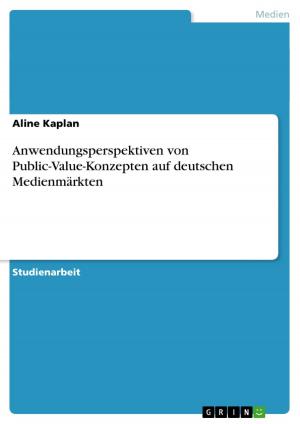How useful is teamwork as a method of doing work?
Business & Finance, Management & Leadership, Management| Author: | Jonas Augustin | ISBN: | 9783640945399 |
| Publisher: | GRIN Verlag | Publication: | June 28, 2011 |
| Imprint: | GRIN Verlag | Language: | English |
| Author: | Jonas Augustin |
| ISBN: | 9783640945399 |
| Publisher: | GRIN Verlag |
| Publication: | June 28, 2011 |
| Imprint: | GRIN Verlag |
| Language: | English |
Essay from the year 2007 in the subject Business economics - Business Management, Corporate Governance, grade: 2,0, Lancaster University, language: English, abstract: decisions can be biased by the ambition of forming a consistent team, which blocks the team members' ability to think rationally. Further disadvantages mentioned by Boddy (2005) are the idea that teams could become too independent from their organisation by developing their own dynamics and the fact that teamwork takes too much time since decisions are mainly made by time consuming discussions However, the actual use of teamwork as a method of doing work is not merely a question about the advantages and disadvantages of teamwork. In fact, it should be examined in two different dimensions - the effectiveness and the efficiency of teamwork. The initial question should therefore be divided into two parts: is teamwork effective in a way that the team achieves the goals that were set? And how many resources have to be spent to achieve these goals? The first question has already been answered. Teams are highly effective. All team members bring in different values, skills and experiences. The results of teams are therefore based on a much broader background compared to those of working groups, which essentially means that team results are more effective. There may be situations where working groups deliver results of almost the same quality but those are rare. Boddy (2005) mentions, in this context, small technical problems, that could be resolved by independently working people. Katzenbach and Smith (1993a) believe that teams outperform working groups especially when the task requires both multiple skills and experience. The second question is not as easy to answer. The literature on teamwork has deeply analysed the notion of effectiveness of teams. But the question about their efficiency has found little attention. In order to assess the efficiency of teamwork I want to have a more detailed look on the problems arising from it. At this point, I need to point out that all the assertions about the advantages of teamwork and its effectiveness are based on the assumptions that the team members work perfectly or at least well together, i.e. that they are implemented correctly. Non-functioning teams can cause serious damage to both the team members and the organisation they belong to. Therefore, it is absolutely vital that the problems that can arise from teamwork are solved promptly. A problem that no one takes care of can delete all benefits of teamwork.
Essay from the year 2007 in the subject Business economics - Business Management, Corporate Governance, grade: 2,0, Lancaster University, language: English, abstract: decisions can be biased by the ambition of forming a consistent team, which blocks the team members' ability to think rationally. Further disadvantages mentioned by Boddy (2005) are the idea that teams could become too independent from their organisation by developing their own dynamics and the fact that teamwork takes too much time since decisions are mainly made by time consuming discussions However, the actual use of teamwork as a method of doing work is not merely a question about the advantages and disadvantages of teamwork. In fact, it should be examined in two different dimensions - the effectiveness and the efficiency of teamwork. The initial question should therefore be divided into two parts: is teamwork effective in a way that the team achieves the goals that were set? And how many resources have to be spent to achieve these goals? The first question has already been answered. Teams are highly effective. All team members bring in different values, skills and experiences. The results of teams are therefore based on a much broader background compared to those of working groups, which essentially means that team results are more effective. There may be situations where working groups deliver results of almost the same quality but those are rare. Boddy (2005) mentions, in this context, small technical problems, that could be resolved by independently working people. Katzenbach and Smith (1993a) believe that teams outperform working groups especially when the task requires both multiple skills and experience. The second question is not as easy to answer. The literature on teamwork has deeply analysed the notion of effectiveness of teams. But the question about their efficiency has found little attention. In order to assess the efficiency of teamwork I want to have a more detailed look on the problems arising from it. At this point, I need to point out that all the assertions about the advantages of teamwork and its effectiveness are based on the assumptions that the team members work perfectly or at least well together, i.e. that they are implemented correctly. Non-functioning teams can cause serious damage to both the team members and the organisation they belong to. Therefore, it is absolutely vital that the problems that can arise from teamwork are solved promptly. A problem that no one takes care of can delete all benefits of teamwork.















